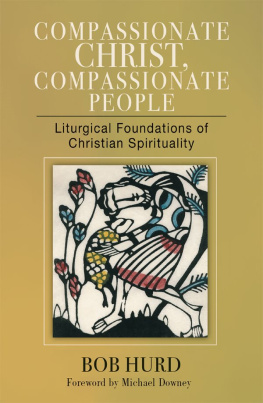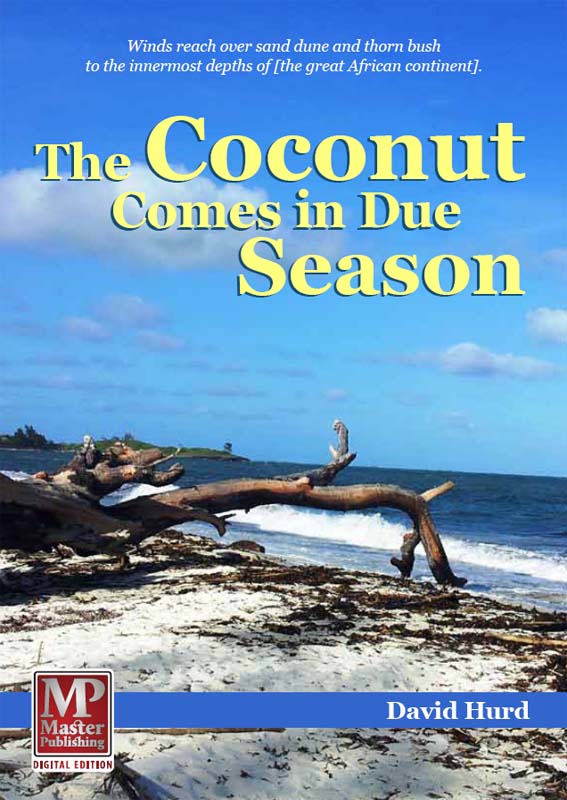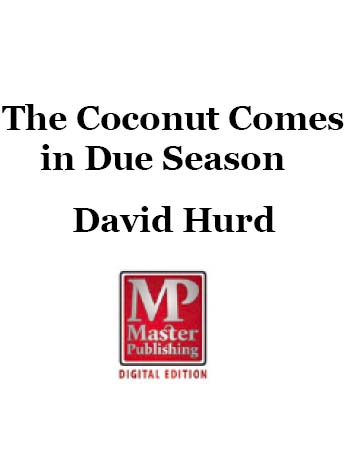Contents
Kiunga was a way of life now gone forever.
Robinson Island held me in her power, it seemed
To do with me exactly as she willed
Here then is the story of my arrival and of adventure along the Kenyan coast; of the strange happenings that have made my island home what it is today.
Foreword
LITTLE IS KNOWN OF DAVID Hurd except what can be gleaned from my fathers memories of interactions with him as his advocate and from a box of Davids writings, which is all that was left of his estate. This, with the breadcrumbs about his life from his first novel, Kidnap at Kiunga, and now from the posthumously published novel The Coconut Comes in Due Season, describe a man who unstintingly embraced the Kenyan people, their traditions, and their way of life with a deep enthusiasm and passion.
David John Broughton Hurd was born in London, England on 13th July 1935. His passport describes him as a 6 foot 1 farmer with blue eyes. David moved to Kenya some time in the late 1950s, starting out in Kisumu on the shores of Lake Victoria, where he had his first job. From there, he moved to the farmlands of the Aberdare Mountains on the Kenyan highlands, and worked with a number of different cattle farmers, eventually setting up his own farm some years later. The drought of 1961, the plague of black caterpillars that followed, and then the floods, submerged all his land and crops, and ultimately ended Davids farming career.
Seven years after arriving in the country, David moved to the Kenyan coast. He and his business partner, Kibanja Kenga, started a fishing business in the coastal town of Lamu. Together with his crew and his sailing dhow, Ghanima, David and Kibanja fished for sharks off the East African coast.
After the rains of 1963, David and Kibanja stopped in Kiunga to ready Ghanima for the December sharking season. That December, Kenya celebrated its independence, and Somali shiftas (bandits) began attacking villages of the new state along the shared border. On 6th February 1964, while visiting Ghanima at the shore, where it was undergoing repairs, David was attacked by a group of shiftas and kidnapped. In the book Kidnap at Kiunga, he tells the story of his capture, ordeal at the hands of the shifta, and eventual release and safe return to Kenya approximately three weeks later.
On 7th December 1966, David renounced his citizenship of the United Kingdom and its colonies, and became a citizen of Kenya under the Kenyan Constitution, 1963.
Three years after his release and during one of his fishing expeditions off the East African coast, David came upon an island in the Indian Ocean, close to Malindi. He was instantly enchanted by it. Friends began to visit him on the island, enjoying his seafood dishes. Drawing on the success of the tourist crowd, David started a restaurant specialising in seafood and Swahili dishes. And later, he constructed rustic style residential cottages on the island for his guests. Those who came to visit him on the island gave it the name Robinson Island after Defoes famous novel and to acknowledge Davids Robinson Crusoe-like appearance and living style.
During his years on Robinson Island, David worked on a number of manuscripts. This particular collection of stories narrates his arrival upon the semi-inhabited island, the construction of a small hotel that he later opened to select groups of tourists, his familiarisation with the local Giriama communities and their culture, and his experiences of the leisure and beauty of life on an East African island. An island that has few, if any, modern comforts, and where fish is freshly caught from the sea and the beverage is locally brewed palm wine. Each chapter is developed around a Swahili proverb and local references are threaded through the entire book, situating it strongly within the Swahili and the Giriama cultures.
Unfortunately, Davids untimely death in a car accident in 1986 prevented him from seeing this or any of his other island-inspired manuscripts through to completion. The accident occurred as he was returning to the island after a trip to Malindi to get fresh supplies.
This collection describes the chosen life of David Hurd.
The chapter titles are the Swahili proverbs referred to in the foreword. The sentences below them are their English translations.
-THE EDITOR
Prologue: Mwanzo Kokosho, Mwisho Mnazi
The Beginning Is a Bud, the Coconut Comes in Due Season
THE SWAHILI ARE DESCENDED FROM the City States of Zinj, a loosely bound empire that prospered for nearly five hundred years along the East African Coast. From their ancient homeland, the descendants of these States still look out across the blue waters of the Indian Ocean. Now, as in times past, the seas are the source of their livelihood, but the lifestyle is no longer grand. Treasure-laden dhows from the Orient rarely visit their ports, and ships plying for trade diminish in numbers as the years go by.
The great wealth bequeathed to the Swahili by the founders of Zinj is no more.
To survive capricious fate, a people must adjust to changing circumstances. The Swahili have turned to fishing and to cutting building poles from the mosquito-infested, mud-oozing mangrove forests, which edge the seawater creeks. No longer can they relax on the carved wooden balconies of their once-famed mansions, watching for the big, lateen-rigged sailing vessels to break the horizon and make their way to port.
Zinj, in the Persian tongue, means land of the black people, and the Persians are thought to have been the first settlers to arrive at the Coast. Their intent was to change the culture of the East African coast for all time.
From the days of Solomon, as recorded in the Books of Kings, dhows have called at the port of Sofala, now Mozambique, to barter cloth, maize, millet, knives, axes, and other common wants for gold from the fabled mines of Ophir in the interior, ivory from herds of elephant, and for exotic animals and birds.
The rise of Islam, and particularly the death of Prophet Mohamed in 632 AD, which divided his followers into two hostile sects (the Shias and Sunnis), brought an influx of settlers to the East African trading posts. With their arrival came craftsmen, masons, wealthy men of business, and farmers with modern ideas and new crops. The City States quickly prospered from this injection of enterprise.
There was little attempt on the part of the Muslims to convert the original inhabitants, but over the centuries, Islamic customs came to dominate the Coast. More and more Africans came into contact with this culture, adopted the faith, and intermarried with the Zinjians to become citizens of the States themselves. Islamic law forbids racial discrimination amongst its followers, and because of this, a new society was born.
Centuries went by. Sultans from different ethnic groups came into and out of power, frequently replaced through defeat at the hands of rulers of other States or by internal political machinations. For them, intrigue and skirmishes became a type of regional recreation.
The mixing of Persian, Arabian, and African blood, and the influences of Indian traderswho contributed aspects of their own cultural heritagecreated a new breed of men. Being Muslims, all were citizens who equally enjoyed privileges and responsibilities. Few of the noble families could claim pure descent from any ethnic group, and it is doubtful if any would have wished to do so. Thus a homogenous society developed.











